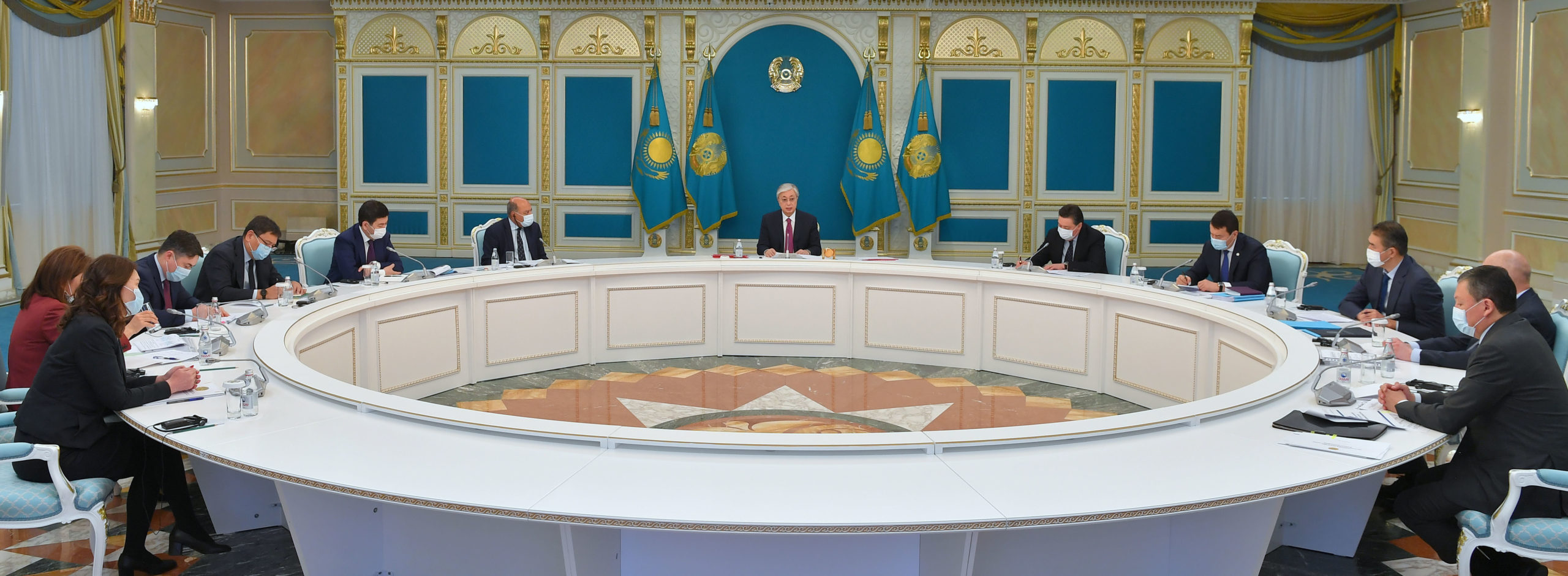NUR-SULTAN – Kazakh President Kassym-Jomart Tokayev chaired the third meeting of the Supreme Council for Reforms that focused on the implementation of the National Development Plan through 2025, a new state planning system, development of the public administration through 2030, among others projects, reported the Akorda press service.

During the meeting. Photo credit: Akorda.kz
The meeting was attended by Kazakh Prime Minister Askar Mamin, Deputy Chief of the Presidential Administration Timur Suleimenov, Agency for Strategic Planning and Reforms Chair Kairat Kelimbetov, and Agency for Civil Service Affairs Chairwoman Anar Zhailganova.
The National Development Plan that outlines the country’s midterm targets consists of 12 strategic areas across three main blocks – institutional, economic, and social.
The key targets envisioned in the document are five percent economic growth by 2025, increasing the share of small and medium enterprises in the gross domestic product to 35 percent (from the current 31.7 percent), increasing the share of investments in fixed capital to 30 percent of the GDP, doubling the share of non-commodity exports to 41 billion tenge (US$96.7 million) and increasing labor productivity by 45 percent.
Tokayev said the country’s three key development goals are focused on the quality of its institutions, the welfare of the population, and a strong economy.
President Tokayev’s new state planning system is designed to ensure “more flexible program documents, closer coordination between strategic and budget planning, and to hold heads of state bodies and organizations accountable for the implementation of the tasks.”
Tokayev states that the draft projects in digitization, agricultural development, business, competition, and environmental protections, should be ready and adopted no later than July 1 of this year. The expert community and the public should be involved in the decision-making process, he added.
“Taken together, all targets should reflect our main goal – increasing the level of competitiveness and joining the ranks of the most developed countries in the world,” said Tokayev.
He emphasized the need for greater coordination between the government and the Parliament, as many reforms will require legislative changes.
Public administration should become more people-oriented. In doing so, the document seeks to enhance the work of the state apparatus, hold it accountable, improve regulatory policies and efficiency of public services. This is all part of a plan to achieve the broader goal of increasing the trust of the people in state institutions.
In line with Tokayev’s task to decrease the role of the state in the economy, Kazakhstan’s privatization plans will be expanded. The number of organizations that will be entirely or partially privatized was increased from 176 to 736.
Privatization of assets worth five trillion tenge (US$11.79 billion) will cut the state participation in the economy by 14 percent.
“It is important to follow the plan. The government’s position should be firm here. We cannot have privatization resulting in the creation of private monopolies and, as a consequence, public discontent. It is necessary to ensure the transparency and fairness of the privatization,” said Tokayev.
He also noted the importance of the upcoming population census in October this year. The census, the third since the country’s independence in 1991, was initially scheduled to take place in October last year.
The census, said Tokayev, will provide crucial analytical information about the real population, its age and sex composition, level of urbanization, incomes, and is needed to “make thorough policy decisions” going forward. Tokayev also announced the creation of a working group headed by the First Deputy Prime Minister.
Officials expect the final data to become available in mid-2022.

